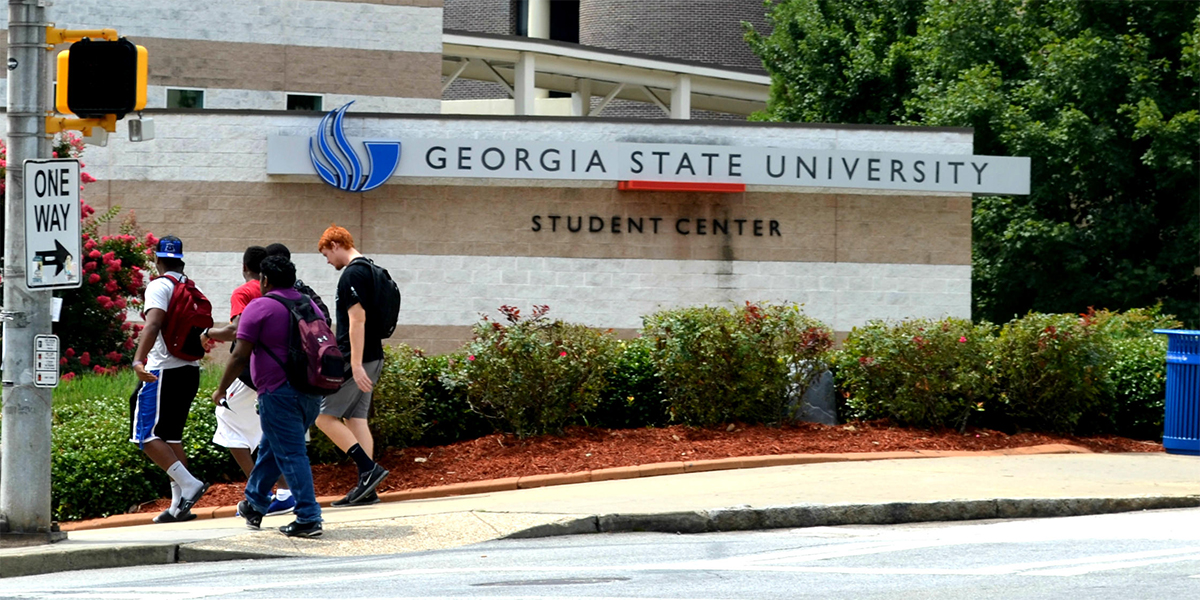More than a third of the 34,000 students enrolled at Georgia State University today are African American.
Six decades ago, that figure was zero.
The catalyst for that change came in 1959 when the NAACP won a federal lawsuit forcing Georgia State College of Business Administration, as GSU was known then, to admit Myra Payne Elliot, Barbara Pace Hunt and Iris Mae Welch–three African American women.
But as a new documentary “In Good Faith” explains, that didn’t happen immediately.
While the women could no longer be denied admission because of their race, the college could keep them out because of a “morality standard.” Both Elliot and Hunt were mothers before they were married, which the court equated with “unsatisfactory character,” the documentary’s narrator explained.
The Georgia Board of Regents prohibited the women from enrolling.
Eventually, those barriers would fall, but—for various reasons—not in time for Elliott, Hunt or Welch to attend.
More than a half-century later–after the publishing of a new book and mini-documentary about their pioneering efforts–Georgia State University will honor the 90-year-old Elliott this weekend with an honorary degree and confer posthumous degrees to the late Hunt and Welch.
Elliot spoke with “All Things Considered” in 2020 about the events and why she never pursued her degree.
“I always wanted to go to college,” said 87-year-old Myra Payne Elliot, the only plaintiff still living, via phone from her Clayton County home. “I had sense enough to know that my family was poor,” she added. “There was no money for college.”
After high school, Elliott attended Spelman for a few semesters, working in the school’s cafeteria to try to make ends meet. But the money just wasn’t there. The single mother reluctantly took a full-time job with the Atlanta Life Insurance Company on Auburn Avenue in downtown, which provided a liveable wage.
The company’s building was just around the corner from what would become Georgia State University. As she walked past the then-tiny campus every day on her way to work, she’d often ponder the possibility of returning to school. As a state-sponsored public college, the tuition might be more attainable, she reasoned.
Eventually, Myra Payne Elliott Dinsmore (her name at the time, reflecting her 13-month marriage to Adolphus Dinsmore Jr.) applied.
But in the mid-1950s, Jim Crow was hard at work in Georgia. The valedictorian of her high school class was denied admission.
Aided by the NAACP’s Thurgood Marshall and Constance Baker Motley of New York and Donald Lee Hollowell in Atlanta, the plaintiffs successfully convinced a federal court to force the school to integrate.
“I was very happy, even though I couldn’t myself go,” Elliott recalled of the decision. “I got married. I had children.”
And she made a choice.
Elliott would set her education aside and devote herself to raising—and educating—her children, although she knew the decision would come at the expense of following her dream.
Over the years, Elliott said she thought about what it would’ve been like if she’d applied and been granted admission. For a while, she said, she was bitter. “But I never let it rule my life.”
As each of her children and later grandchildren graduated high school, she encouraged them to go to college. And they did—degrees among them were earned at institutions like Northwestern and Wellesley.
But Elliott rarely spoke of any of it.
June Holland, Elliott’s daughter, said she was 37-years old before she knew what her mom had been through. Even then, it was only “bits and pieces,” she said.
“She would always say she won a lawsuit with attorney Hollowell, and they fought for us to go to school. They fought us the vote. They fought for us to be able to ride on the bus [or] to go buy a hamburger,” Holland said, calling her mother’s recounting a “litany” she’d go into from time to time.
But it would take the publication of Maurice C. Daniels’ book, “Ground Crew: The Fight to End Segregation at Georgia State,” before Holland got the full story.
“I kept asking, ‘Why didn’t you tell us that?’”
Elliott replied the story was “just something she didn’t want to talk about.”
Now Holland gets why.
As Georgia State University honored Elliott, Hunt and Welch this week, it became clear to a lot more people the magnitude of the women’s fight. The three women in a way opened the door for each of the 12,000 plus African American students now enrolled at Georgia State.
It’s a fact Elliott acknowledged, but humbly clarified she never did it for the “fame and the glory.”








